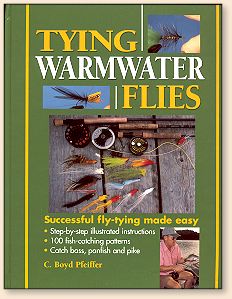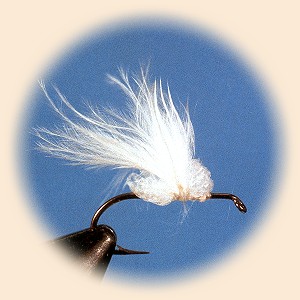Marabou Cottonwood Seed Carp Fly
By C. Boyd Pfeiffer
 Publisher's Note: We don't break our own rules
very often, but we are doing it here. Whenever possible
we use flies which have photographic step-by-step
instructions. This fly does not - but the fly and
the use of materials is unusual enough to merit being
Fly of the Week. This fly is from a new book,
Tying Warmwater Flies which covers essential
tools and accessories, tying materials, tying methods
(including several methods of doing weed guards), and
One Hundred Top Warmwater Fly Patterns. It is an
excellent tying resource with very good color photos!
Perhaps it will spark some ideas for your own fishery.
Publisher's Note: We don't break our own rules
very often, but we are doing it here. Whenever possible
we use flies which have photographic step-by-step
instructions. This fly does not - but the fly and
the use of materials is unusual enough to merit being
Fly of the Week. This fly is from a new book,
Tying Warmwater Flies which covers essential
tools and accessories, tying materials, tying methods
(including several methods of doing weed guards), and
One Hundred Top Warmwater Fly Patterns. It is an
excellent tying resource with very good color photos!
Perhaps it will spark some ideas for your own fishery.
Carp in late spring and early summer often cruise the
surface, sipping in cottonwood seeds that have blown
onto the water and float there as a result of their
light fluff.
This fly in any size can imitate cottonwood seedpods
that carp relish when these light bits of fluff land on
the water surface. This fly can also be tied using CDC
feathers or rabbit fur of the marabou, but the marabou
will float for a while and makes a simple fly to tie.
Since these cottonwood seeds are small, these flies are
best tied as small as possible, considering the size wire
and hook necessary to handle a big carp. Realize that
as a result of the light wire hook, you must play these
fish lightly and carefully, even though you might be
using a powerful rod that will allow for a tougher fight.
[publisher's note: there are trout streams which are
shaded by cottonwoods in the west as well. Brown trout
also eat cottonwood seeds, big brown trout.]
Materials List Marabou Cottonwood Seed Carp Fly:
Hook: Standard dry fly, size 14 to 10.
Thread: White.
Wing: Short full wing of white marabou.
Flotation: Tiney cylinder of white foam, tied
McMurray style (optional).
Instructions - Marabou Cottonwood Seed Carp Fly:
1. Tie in thread at the midpoint of the hook shank.
2. Tie in a small short bundle of white foam, pinching
the foam in the middle with the thread. (Optional -
provides additional flotation for longer fishing and use.)
3. Prepare a thick but very short bundle of white
marabou. This bundle should be very fluffy and no
longer than the length of the hook.
4. Lightly moisten the marabou bundle to handle it,
and tie in the butt ends in the middle of the hook, on
top of the tie down point for the white foam.
5. Make a few more wraps with the thread and tie off with
a whip finish. Clip the excess thread.
6. Seal the wrap with head cement, taking care to
avoid getting it on the marabou. ~ C. Boyd Pfeiffer
Credits: From Tying Warmwater Flies,
by C. Boyd Pfeiffer, published by Krause Publishing.
We appreciate use permission.
|



